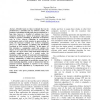Free Online Productivity Tools
i2Speak
i2Symbol
i2OCR
iTex2Img
iWeb2Print
iWeb2Shot
i2Type
iPdf2Split
iPdf2Merge
i2Bopomofo
i2Arabic
i2Style
i2Image
i2PDF
iLatex2Rtf
Sci2ools
130
click to vote
JCM
2007
2007
A Dynamic Scheduling Algorithm for Divisible Loads in Grid Environments
—Divisible loads are those workloads that can be partitioned by a scheduler into any arbitrary chunks. The problem of scheduling divisible loads has been defined for a long time, however, a handful of solutions have been proposed. Furthermore, almost all proposed approaches attempt to perform scheduling in dedicated environments such as LANs, whereas scheduling in non-dedicated environments such as Grids remains an open problem. In Grids, the incessant variation of a worker's computing power is a chief difficulty of splitting and distributing workloads to Grid workers efficiently. In this paper, we first introduce a computation model that explains the impact of local (internal) tasks and Grid (external) tasks that arrive at a given worker. This model helps estimate the available computing power of a worker under the fluctuation of the number of local and Grid applications. Based on this model, we propose the CPU power prediction strategy. Additionally, we build a new dynamic sch...
Related Content
| Added | 15 Dec 2010 |
| Updated | 15 Dec 2010 |
| Type | Journal |
| Year | 2007 |
| Where | JCM |
| Authors | Nguyen The Loc, Said Elnaffar |
Comments (0)

